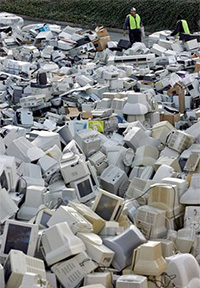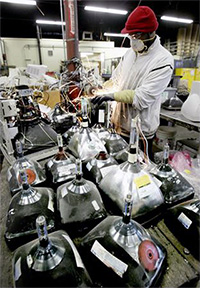A warning for those recycling electronics
Concerns are raised about where junk taken to free events ends up
by Lisa Stiffler (P-I Reporter), Seattle Post-Intelligencer
 |
 |
 |
 |
| |
 |
|
| |
The amount of electronic waste brought to a free recycling event at Seattle Pacific University far exceeded what organizer Jason Purcell expected.
©Mike Urban/Seattle Post-Intelligencer
|
|
 |
 |
 |
| |
 |
|
| |
Total Reclaim worker Michael Walker dismantles a computer monitor for disposal. The Seattle company is touted as one of the most environmentally responsible e-recyclers in the state.
©Seattle Post-Intelligencer |
|
 |
 |
 |
|
| |
18 April 2008 – Green-minded consumers beware. Free electronics collection events touted as planet friendly aren't always as ecologically sound as they seem, says a watchdog group focused on preventing the export of dangerous e-waste.
The trouble is it's nearly impossible for well-meaning consumers to know what happens to the pollutants in the products they're dropping off. The products can be shipped all over the world and pass through multiple handlers before reaching their final resting place.
"One Earth, One Day, Rid Your Junk the Right Way!" is the slogan for Saturday's free collection of electronic waste organized by the national trash hauling chain 1-800-GOT-JUNK?. Collections are happening in Seattle, Bellevue, Olympia and about 70 other cities nationally. They say they have taken steps to make sure the material will be disposed of properly.
But after taking a look at the list of recyclers who will be getting the dumped computers, TVs, cell phones, printers, keyboards and other waste, e-trash experts with Seattle's Basel Action Network are concerned about where the refuse is going.
"Avoid this event like the plague if you want to do the right thing," said Jim Puckett, coordinator for BAN. "We are not convinced this is a sustainable pathway."
The concern is that the waste will be shipped to China or other southeast Asian or African countries, ultimately being melted down or dunked in acid to recover trace amounts of valuable metals. BAN was the first organization to publicize this sort of activity in 2002, documenting towering heaps of scrapped electronics and the poisoning of people and the environment. The electronics contain lead, mercury and other toxic ingredients requiring careful handling.
Officials with GOT-JUNK? said the waste collected in their event will not be exported.
"This is our opportunity for one day to make sure what we pick up is not being dumped in a landfill or sent overseas," said Tania Hall, senior spokeswoman for the company. "Everyone is doing the best they can. This is a good event."
Hall said the participating GOT-JUNK franchises were required to visit the recycling facilities they're using or get a letter of assurance that they would not send the waste abroad. "We took this very, very seriously."
BAN remains skeptical.
"We are highly unconvinced," Puckett said. Recyclers can obscure what's happening to the e-trash by having brokers send the waste overseas so they can honestly claim that they do not. Or they can claim the waste isn't being "disposed of" by classifying the dangerous recovery of metals as "recycling."
Watchdogs warn that free collections -- while often well-intended -- can result in cost-cutting elsewhere at the expense of the environment.
"This material is very expensive to deal with properly in this country," Puckett said.
Jason Purcell learned that lesson in a recent e-waste collection event he organized at Seattle Pacific University. Purcell, an adjunct faculty member in physical education and martial arts, organized a free recycling event last month that generated 14 commercial truckloads of trash. A school parking lot the size of a football field was filled 4 to 8 feet high.
Expecting to fill only a truck or two, Purcell had to supplement his handful of volunteers with a crew of paid workers. Even so, much of the waste from the weekend event remained in the lot for days. TVs with broken screens sat in the rain.
The $13,000 received in donations from people dropping off waste paid for the labor; $500 went to the Union Gospel Mission -- the intended recipient of extra proceeds. It cost an additional $15,000 to pay for the disposal -- in part because of contracts canceled by recyclers, said Purcell, which he blamed on meddling by BAN, an accusation the nonprofit denies.
Recycling and disposal was handled by a California company, which BAN investigated and deemed responsible -- though it's still unclear where a small portion of the waste wound up.
Despite the headaches, Purcell said it was a success, getting thousands of tons of trash out of closets, backyards and landfills and put to reuse or safe disposal. He wants to do it again -- and has ideas for doing it more cheaply and efficiently.
"We need to raise awareness," he said. People need to understand "there are toxics in this stuff and make sure this stuff is handled properly."
The hope is that the situation in Washington will improve come January when a free, statewide electronics take-back program takes effect. By law, electronics manufacturers selling items here must finance a program that will accept at no charge scrapped TVs, computers and monitors from residents, small businesses, small governments, charities and schools.
For now, consumers can participate in free events or take electronics to businesses and nonprofit groups that recycle or reuse the items. Disposing of outdated computer monitors and TVs in this way can cost $10 to $50 each.
In coming months there's likely to be even more dumped TVs as U.S. broadcasts will go to a digital-only format in February. Some analog TVs can be adapted to get the new signal, but older ones will become obsolete.
Dan Cleator is general manager for the GOT-JUNK franchise organizing the Seattle collection. They're not accepting TVs but will take other electronics.
Cleator doesn't expect the event to cost his business much money, as his recycler, MIC Total Recycle, is accepting the trash for free. BAN tried to research where the waste from MIC would end up, but ran into a dead end at a California recycler being used.
Cleator said he was assured none of the debris would be shipped abroad and that he trusts MIC. He also appreciates the questions raised by BAN.
"I agree with their concerns, and I know our company does as well. I've heard some of the horror stories about kids in Asia getting lead poisoning. Personally and professionally, it would kill me if I knew that was going on."
E-waste Disposal
- 1-800-GOT-JUNK? e-waste collections are being held in Seattle, Bellevue and elsewhere, though TVs are not accepted at many locations and a local watchdog group is concerned about where the waste is going: 1800gotjunk.com/earthday.
- Basel Action Network tracks e-waste: ban.org.
- BAN-approved Washington recyclers: InterConnection, Mojo Systems, Re-PC, RE Lectronics and The RE Store, Total Reclaim.
- The region's Take It Back network includes businesses that pledge safe disposal: takeitbacknetwork.org.
- Beginning in January, Washington households, small businesses, small governments, charities and schools will be able to dispose of TVs, computers and monitors for free: ecy.wa.gov/programs/swfa/eproductrecycle.
P-I reporter Lisa Stiffler can be reached at 206-448-8042 or lisastiffler@seattlepi.com. Read her blog on the environment at datelineearth.com.
FAIR USE NOTICE. This document contains copyrighted material whose use has not been specifically authorized by the copyright owner. The Basel Action Network is making this article available in our efforts to advance understanding of ecological sustainability and environmental justice issues. We believe that this constitutes a 'fair use' of the copyrighted material as provided for in section 107 of the US Copyright Law. If you wish to use this copyrighted material for purposes of your own that go beyond 'fair use', you must obtain permission from the copyright owner.
More News
|